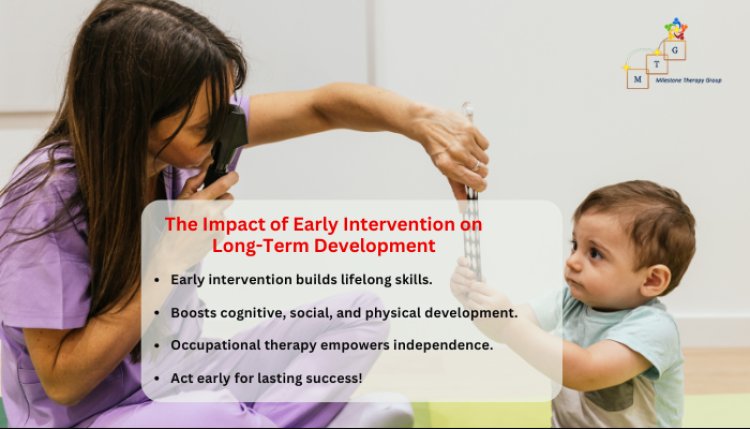The Impact of Early Intervention on Long-Term Development
Share this Post to earn Money ( Upto ₹100 per 1000 Views )

Summary:
Early intervention can be a game-changer in a child's development. This proactive approach targets developmental delays and challenges during the critical early years of a child’s life, offering a strong foundation for lifelong success. For parents and caregivers, understanding the profound impact of early intervention is essential, as it can significantly influence a child’s emotional, cognitive, and physical development.
What Is Early Intervention?
Early intervention encompasses a range of services and support systems designed to address developmental delays in children from birth to age three. These services can include speech therapy, physical therapy, and early intervention occupational therapy. The goal is to help children develop the skills they need to thrive in everyday life, whether at home, in school, or in social settings.
This period is vital because the brain's plasticity is at its peak during these formative years. By addressing developmental challenges early, we can optimize a child’s potential and prevent future struggles.
Why Timing Matters
The earlier the intervention, the more impactful it can be. During a child’s early years, neural pathways are rapidly forming, making it easier to address developmental challenges. Research shows that early intervention can improve outcomes in various areas, including:
-
Cognitive Development: Building critical thinking and problem-solving skills.
-
Social-Emotional Growth: Enhancing the ability to form relationships and manage emotions.
-
Physical Skills: Improving motor skills, balance, and coordination through therapies like early intervention occupational therapy.
By tackling these areas proactively, children are better equipped to handle academic and social demands later in life.
The Role of Early Intervention Occupational Therapy
Occupational therapy plays a vital role in early intervention. Therapists work with children to develop the skills needed for daily activities, such as eating, dressing, and playing. Early intervention occupational therapy focuses on fostering independence and enhancing a child’s quality of life.
Key aspects of occupational therapy in early intervention include:
-
Fine Motor Skills: Activities to improve hand-eye coordination and dexterity.
-
Sensory Integration: Helping children process and respond to sensory stimuli effectively.
-
Adaptive Skills: Teaching strategies for self-care tasks like brushing teeth or tying shoelaces.
These skills are critical for a child’s development and can lay the groundwork for success in school and beyond.
Long-Term Benefits of Early Intervention
The benefits of early intervention extend far beyond childhood. Here are some of the long-term advantages:
Improved Academic Performance
Children who receive early intervention services often perform better academically. They develop the foundational skills needed for learning, such as attention, memory, and problem-solving abilities.
Enhanced Social Skills
By addressing social-emotional challenges early, children are better equipped to navigate relationships, work collaboratively, and handle conflicts.
Increased Independence
Therapies like early intervention occupational therapy empower children to become more self-sufficient, reducing reliance on caregivers as they grow older.
Reduced Need for Special Education Services
Intervening early can mitigate the need for specialized education services later in life, saving families and educational systems significant resources.
The Family’s Role in Early Intervention
Parents and caregivers are critical partners in the early intervention process. Their involvement ensures that strategies learned in therapy are reinforced at home and in everyday routines. Here are some ways families can contribute:
-
Stay Informed: Learn about your child’s developmental milestones and seek professional advice if you notice delays.
-
Collaborate with Therapists: Regular communication with therapists helps create a cohesive plan for your child.
-
Provide a Supportive Environment: Encourage your child’s growth by offering opportunities for practice and exploration.
Early Intervention Success Stories
Countless families have experienced the transformative power of early intervention. For instance, a child struggling with delayed speech may begin to form sentences after consistent therapy sessions. Similarly, children facing challenges with motor skills can achieve remarkable milestones with the help of early intervention occupational therapy.
These successes underscore the importance of taking action early. They also highlight how professional services, combined with family support, can make a lasting difference.
Evidence Supporting Early Intervention
Numerous studies affirm the efficacy of early intervention programs. For example, according to research cited by Early childhood intervention, children who receive early intervention services demonstrate improved developmental outcomes and higher rates of success in adulthood. These findings emphasize the critical nature of addressing developmental concerns during the early years.
Final Thought
Early intervention is a powerful tool that can change the trajectory of a child’s life. By addressing challenges early and leveraging resources like Milestone Therapy, families can ensure their children reach their full potential. For more information on how to begin this journey, visit Milestone Therapy today. Taking the first step could be the key to unlocking a brighter future for your child.















